Exploring Corporate Governance: Directors' Duties and Independence
VerifiedAdded on 2023/06/11
|6
|1265
|263
Report
AI Summary
This report delves into key aspects of corporate governance, focusing on the duties of directors under common and statutory law, particularly the Corporations Act 2001 (Cth). It addresses whether directors adequately consider the interests of stakeholders beyond shareholders, referencing the ASIC v Hellicar case to illustrate the importance of pursuing profits while also considering creditor interests during insolvency. The report further examines the role of independent directors in monitoring company affairs, referencing ASX principles and highlighting the balance between independence and expertise needed for effective governance. It concludes that while independent directors may face challenges due to limited time and expertise, they are crucial for impartial decision-making and overall corporate governance effectiveness. The report emphasizes the need for a mix of independent and non-independent directors to ensure informed and responsible corporate leadership. Desklib provides access to this and other solved assignments for students.
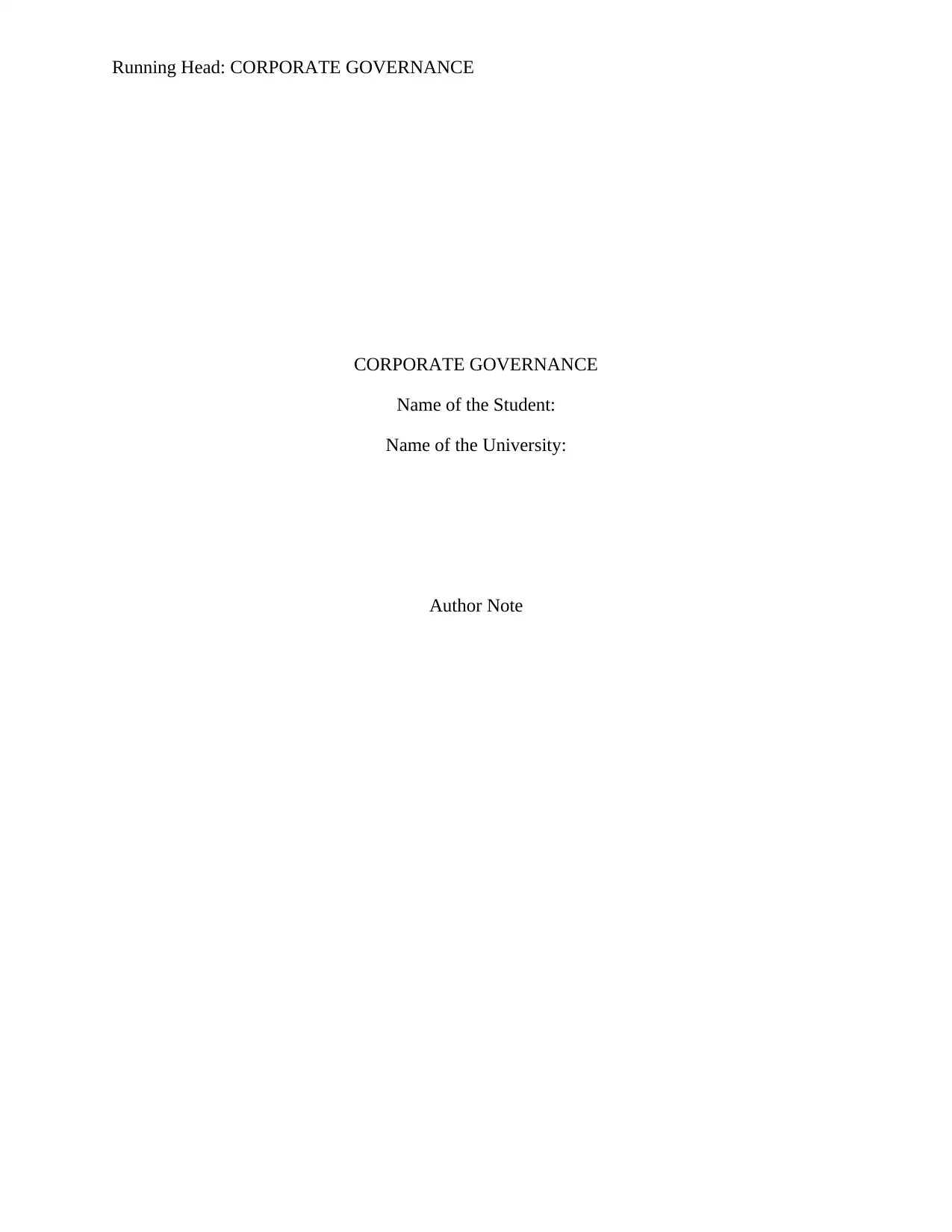
Running Head: CORPORATE GOVERNANCE
CORPORATE GOVERNANCE
Name of the Student:
Name of the University:
Author Note
CORPORATE GOVERNANCE
Name of the Student:
Name of the University:
Author Note
Paraphrase This Document
Need a fresh take? Get an instant paraphrase of this document with our AI Paraphraser
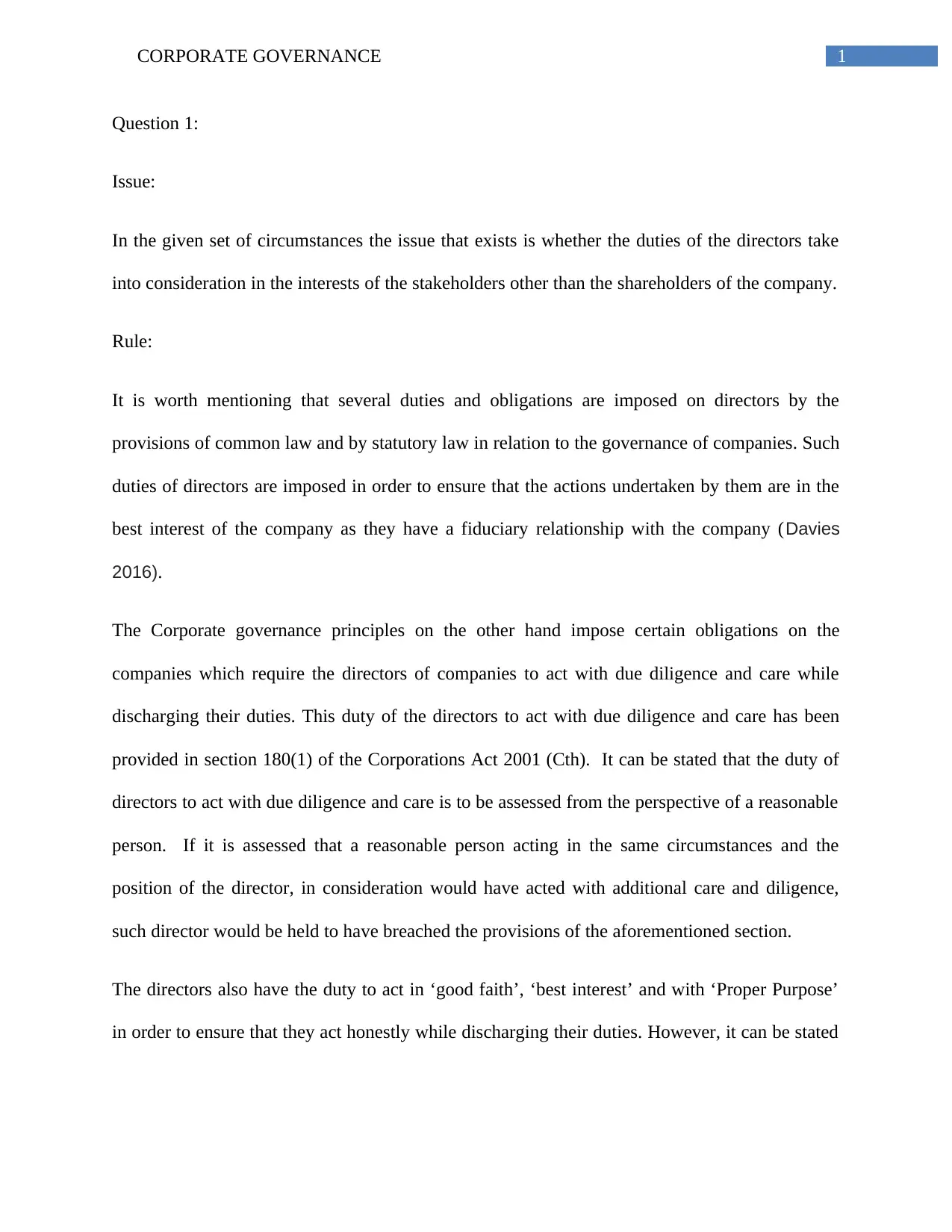
1CORPORATE GOVERNANCE
Question 1:
Issue:
In the given set of circumstances the issue that exists is whether the duties of the directors take
into consideration in the interests of the stakeholders other than the shareholders of the company.
Rule:
It is worth mentioning that several duties and obligations are imposed on directors by the
provisions of common law and by statutory law in relation to the governance of companies. Such
duties of directors are imposed in order to ensure that the actions undertaken by them are in the
best interest of the company as they have a fiduciary relationship with the company (Davies
2016).
The Corporate governance principles on the other hand impose certain obligations on the
companies which require the directors of companies to act with due diligence and care while
discharging their duties. This duty of the directors to act with due diligence and care has been
provided in section 180(1) of the Corporations Act 2001 (Cth). It can be stated that the duty of
directors to act with due diligence and care is to be assessed from the perspective of a reasonable
person. If it is assessed that a reasonable person acting in the same circumstances and the
position of the director, in consideration would have acted with additional care and diligence,
such director would be held to have breached the provisions of the aforementioned section.
The directors also have the duty to act in ‘good faith’, ‘best interest’ and with ‘Proper Purpose’
in order to ensure that they act honestly while discharging their duties. However, it can be stated
Question 1:
Issue:
In the given set of circumstances the issue that exists is whether the duties of the directors take
into consideration in the interests of the stakeholders other than the shareholders of the company.
Rule:
It is worth mentioning that several duties and obligations are imposed on directors by the
provisions of common law and by statutory law in relation to the governance of companies. Such
duties of directors are imposed in order to ensure that the actions undertaken by them are in the
best interest of the company as they have a fiduciary relationship with the company (Davies
2016).
The Corporate governance principles on the other hand impose certain obligations on the
companies which require the directors of companies to act with due diligence and care while
discharging their duties. This duty of the directors to act with due diligence and care has been
provided in section 180(1) of the Corporations Act 2001 (Cth). It can be stated that the duty of
directors to act with due diligence and care is to be assessed from the perspective of a reasonable
person. If it is assessed that a reasonable person acting in the same circumstances and the
position of the director, in consideration would have acted with additional care and diligence,
such director would be held to have breached the provisions of the aforementioned section.
The directors also have the duty to act in ‘good faith’, ‘best interest’ and with ‘Proper Purpose’
in order to ensure that they act honestly while discharging their duties. However, it can be stated
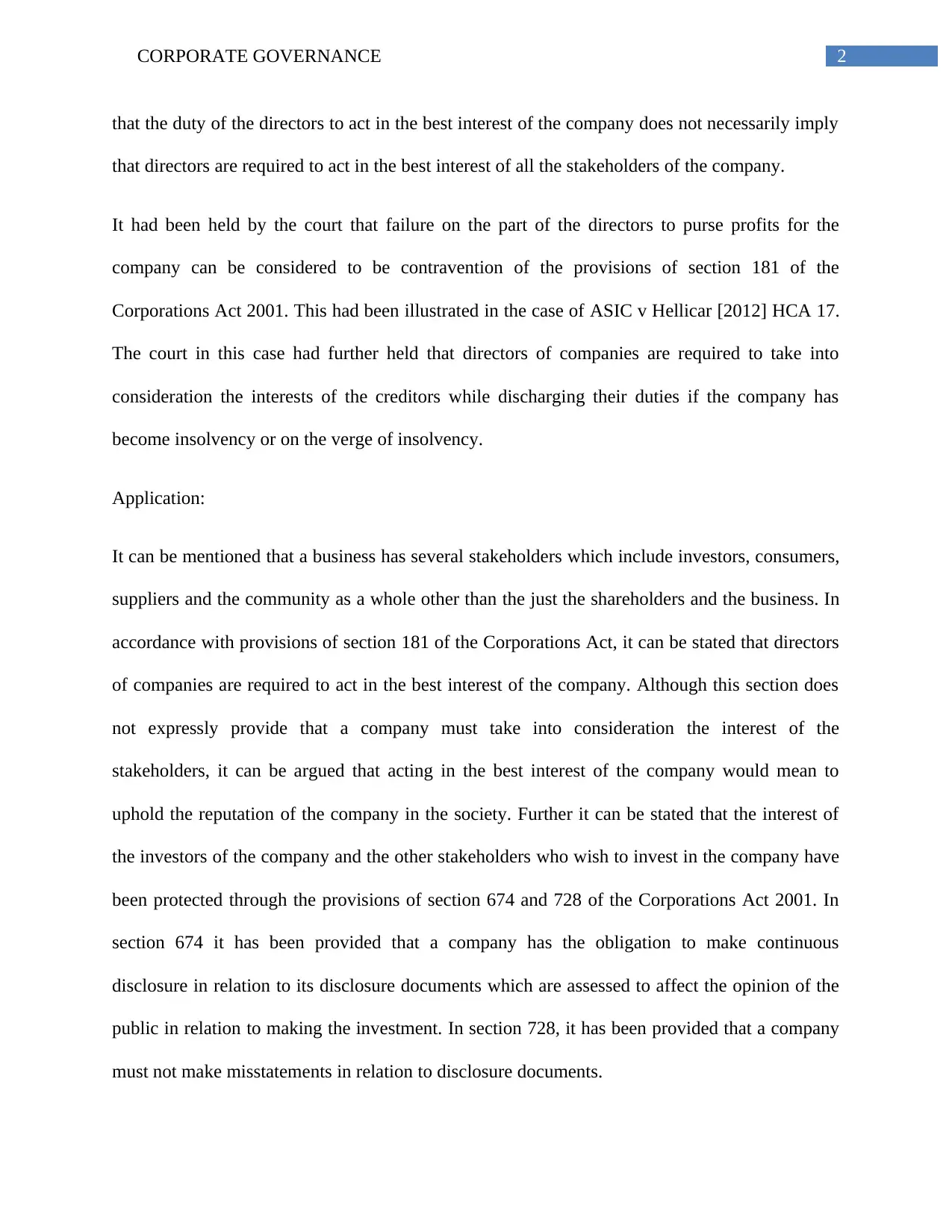
2CORPORATE GOVERNANCE
that the duty of the directors to act in the best interest of the company does not necessarily imply
that directors are required to act in the best interest of all the stakeholders of the company.
It had been held by the court that failure on the part of the directors to purse profits for the
company can be considered to be contravention of the provisions of section 181 of the
Corporations Act 2001. This had been illustrated in the case of ASIC v Hellicar [2012] HCA 17.
The court in this case had further held that directors of companies are required to take into
consideration the interests of the creditors while discharging their duties if the company has
become insolvency or on the verge of insolvency.
Application:
It can be mentioned that a business has several stakeholders which include investors, consumers,
suppliers and the community as a whole other than the just the shareholders and the business. In
accordance with provisions of section 181 of the Corporations Act, it can be stated that directors
of companies are required to act in the best interest of the company. Although this section does
not expressly provide that a company must take into consideration the interest of the
stakeholders, it can be argued that acting in the best interest of the company would mean to
uphold the reputation of the company in the society. Further it can be stated that the interest of
the investors of the company and the other stakeholders who wish to invest in the company have
been protected through the provisions of section 674 and 728 of the Corporations Act 2001. In
section 674 it has been provided that a company has the obligation to make continuous
disclosure in relation to its disclosure documents which are assessed to affect the opinion of the
public in relation to making the investment. In section 728, it has been provided that a company
must not make misstatements in relation to disclosure documents.
that the duty of the directors to act in the best interest of the company does not necessarily imply
that directors are required to act in the best interest of all the stakeholders of the company.
It had been held by the court that failure on the part of the directors to purse profits for the
company can be considered to be contravention of the provisions of section 181 of the
Corporations Act 2001. This had been illustrated in the case of ASIC v Hellicar [2012] HCA 17.
The court in this case had further held that directors of companies are required to take into
consideration the interests of the creditors while discharging their duties if the company has
become insolvency or on the verge of insolvency.
Application:
It can be mentioned that a business has several stakeholders which include investors, consumers,
suppliers and the community as a whole other than the just the shareholders and the business. In
accordance with provisions of section 181 of the Corporations Act, it can be stated that directors
of companies are required to act in the best interest of the company. Although this section does
not expressly provide that a company must take into consideration the interest of the
stakeholders, it can be argued that acting in the best interest of the company would mean to
uphold the reputation of the company in the society. Further it can be stated that the interest of
the investors of the company and the other stakeholders who wish to invest in the company have
been protected through the provisions of section 674 and 728 of the Corporations Act 2001. In
section 674 it has been provided that a company has the obligation to make continuous
disclosure in relation to its disclosure documents which are assessed to affect the opinion of the
public in relation to making the investment. In section 728, it has been provided that a company
must not make misstatements in relation to disclosure documents.
⊘ This is a preview!⊘
Do you want full access?
Subscribe today to unlock all pages.

Trusted by 1+ million students worldwide
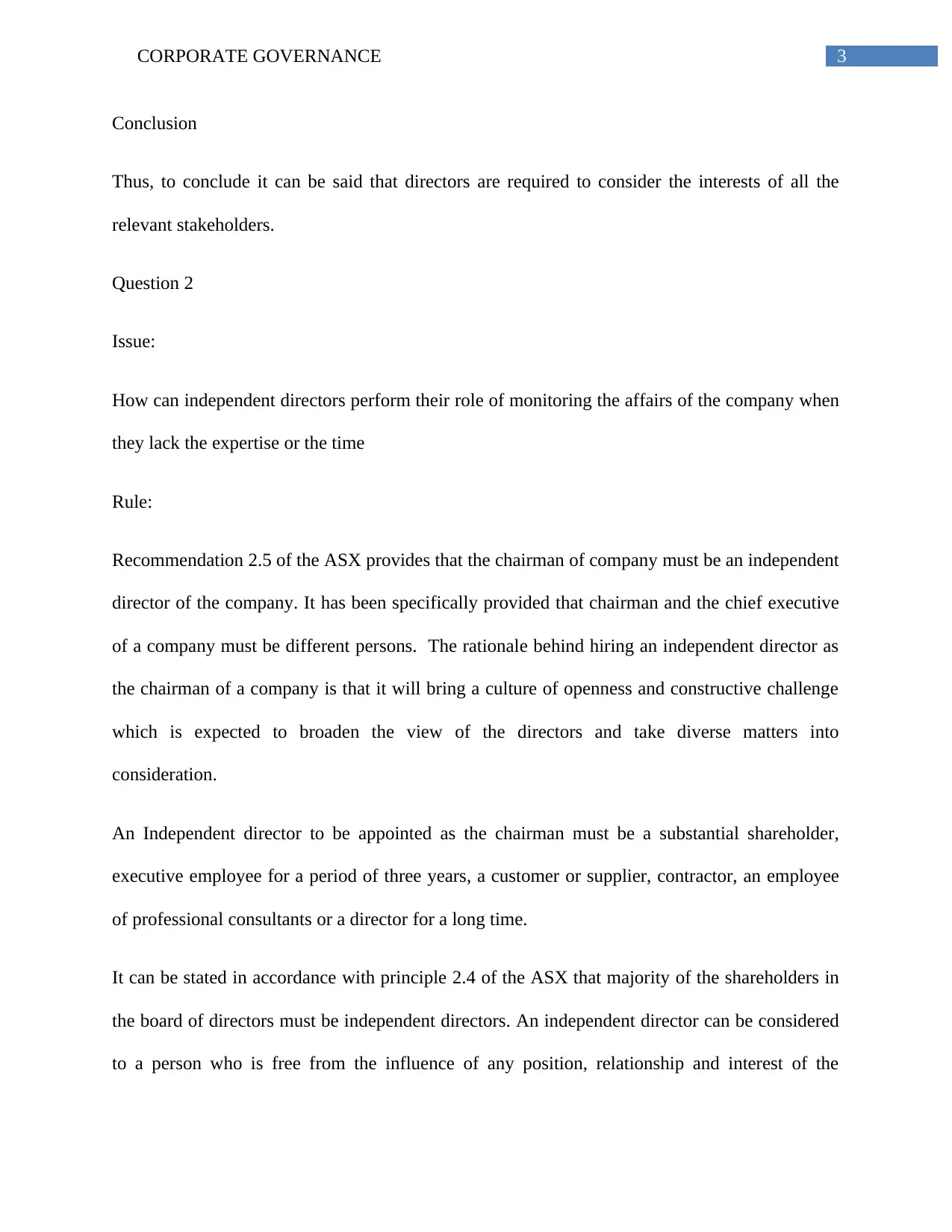
3CORPORATE GOVERNANCE
Conclusion
Thus, to conclude it can be said that directors are required to consider the interests of all the
relevant stakeholders.
Question 2
Issue:
How can independent directors perform their role of monitoring the affairs of the company when
they lack the expertise or the time
Rule:
Recommendation 2.5 of the ASX provides that the chairman of company must be an independent
director of the company. It has been specifically provided that chairman and the chief executive
of a company must be different persons. The rationale behind hiring an independent director as
the chairman of a company is that it will bring a culture of openness and constructive challenge
which is expected to broaden the view of the directors and take diverse matters into
consideration.
An Independent director to be appointed as the chairman must be a substantial shareholder,
executive employee for a period of three years, a customer or supplier, contractor, an employee
of professional consultants or a director for a long time.
It can be stated in accordance with principle 2.4 of the ASX that majority of the shareholders in
the board of directors must be independent directors. An independent director can be considered
to a person who is free from the influence of any position, relationship and interest of the
Conclusion
Thus, to conclude it can be said that directors are required to consider the interests of all the
relevant stakeholders.
Question 2
Issue:
How can independent directors perform their role of monitoring the affairs of the company when
they lack the expertise or the time
Rule:
Recommendation 2.5 of the ASX provides that the chairman of company must be an independent
director of the company. It has been specifically provided that chairman and the chief executive
of a company must be different persons. The rationale behind hiring an independent director as
the chairman of a company is that it will bring a culture of openness and constructive challenge
which is expected to broaden the view of the directors and take diverse matters into
consideration.
An Independent director to be appointed as the chairman must be a substantial shareholder,
executive employee for a period of three years, a customer or supplier, contractor, an employee
of professional consultants or a director for a long time.
It can be stated in accordance with principle 2.4 of the ASX that majority of the shareholders in
the board of directors must be independent directors. An independent director can be considered
to a person who is free from the influence of any position, relationship and interest of the
Paraphrase This Document
Need a fresh take? Get an instant paraphrase of this document with our AI Paraphraser
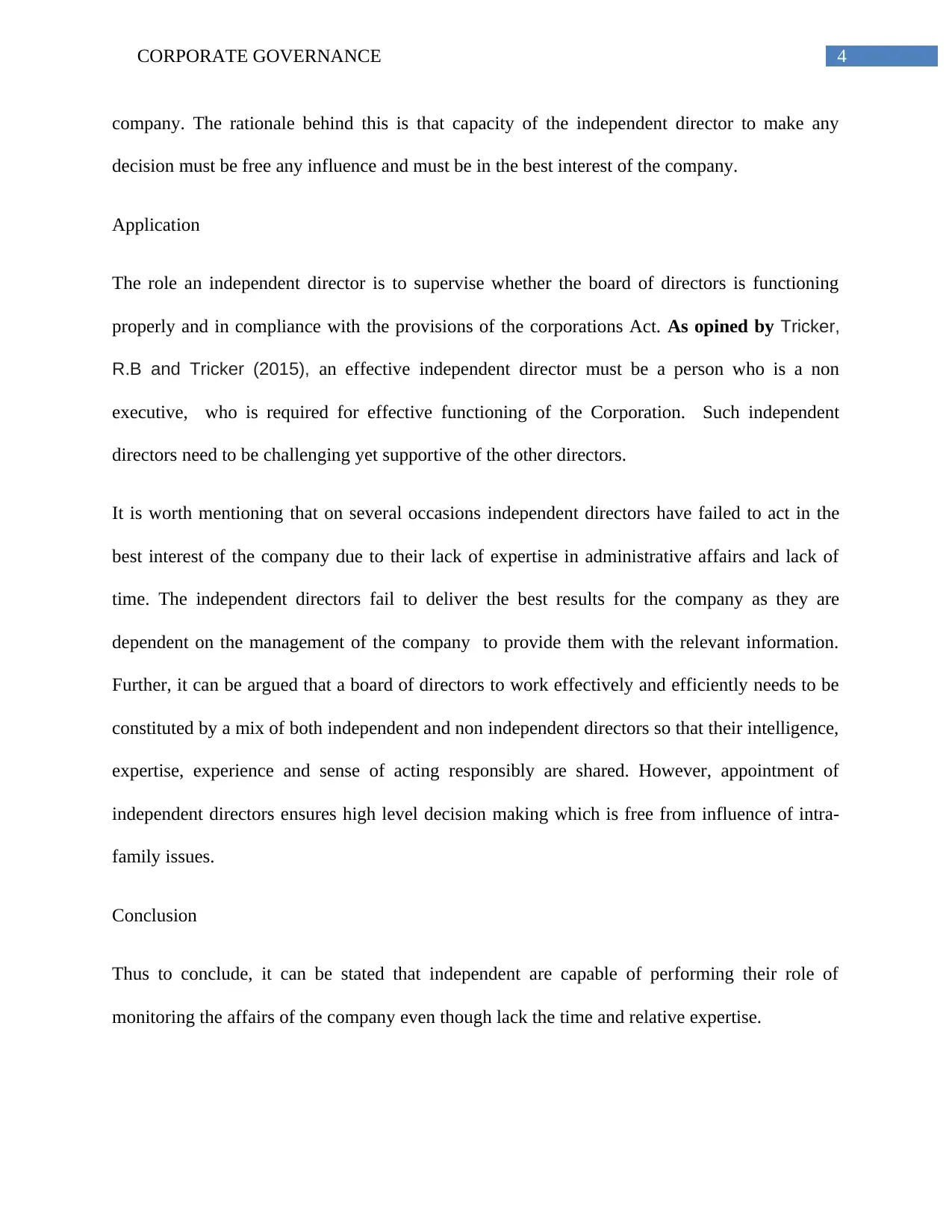
4CORPORATE GOVERNANCE
company. The rationale behind this is that capacity of the independent director to make any
decision must be free any influence and must be in the best interest of the company.
Application
The role an independent director is to supervise whether the board of directors is functioning
properly and in compliance with the provisions of the corporations Act. As opined by Tricker,
R.B and Tricker (2015), an effective independent director must be a person who is a non
executive, who is required for effective functioning of the Corporation. Such independent
directors need to be challenging yet supportive of the other directors.
It is worth mentioning that on several occasions independent directors have failed to act in the
best interest of the company due to their lack of expertise in administrative affairs and lack of
time. The independent directors fail to deliver the best results for the company as they are
dependent on the management of the company to provide them with the relevant information.
Further, it can be argued that a board of directors to work effectively and efficiently needs to be
constituted by a mix of both independent and non independent directors so that their intelligence,
expertise, experience and sense of acting responsibly are shared. However, appointment of
independent directors ensures high level decision making which is free from influence of intra-
family issues.
Conclusion
Thus to conclude, it can be stated that independent are capable of performing their role of
monitoring the affairs of the company even though lack the time and relative expertise.
company. The rationale behind this is that capacity of the independent director to make any
decision must be free any influence and must be in the best interest of the company.
Application
The role an independent director is to supervise whether the board of directors is functioning
properly and in compliance with the provisions of the corporations Act. As opined by Tricker,
R.B and Tricker (2015), an effective independent director must be a person who is a non
executive, who is required for effective functioning of the Corporation. Such independent
directors need to be challenging yet supportive of the other directors.
It is worth mentioning that on several occasions independent directors have failed to act in the
best interest of the company due to their lack of expertise in administrative affairs and lack of
time. The independent directors fail to deliver the best results for the company as they are
dependent on the management of the company to provide them with the relevant information.
Further, it can be argued that a board of directors to work effectively and efficiently needs to be
constituted by a mix of both independent and non independent directors so that their intelligence,
expertise, experience and sense of acting responsibly are shared. However, appointment of
independent directors ensures high level decision making which is free from influence of intra-
family issues.
Conclusion
Thus to conclude, it can be stated that independent are capable of performing their role of
monitoring the affairs of the company even though lack the time and relative expertise.
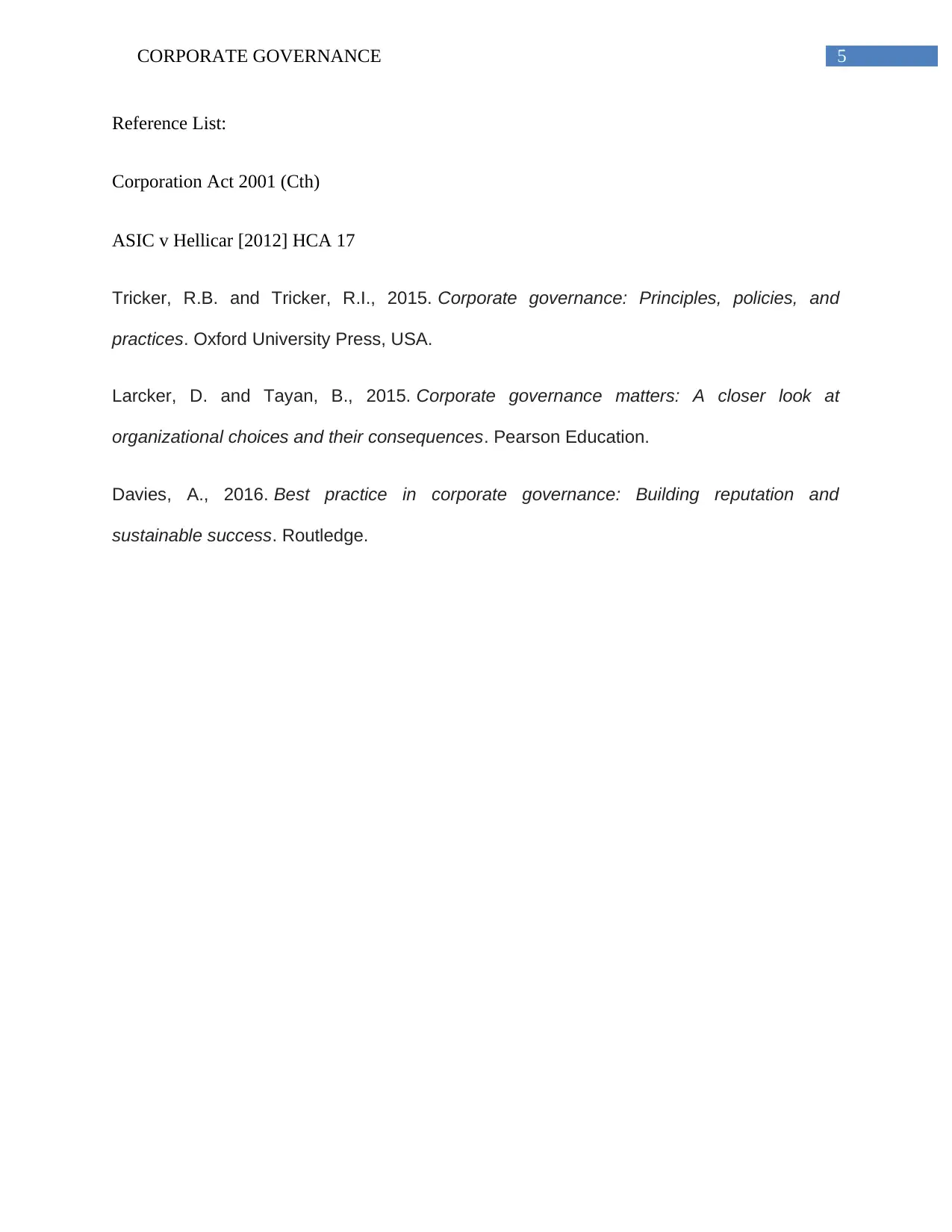
5CORPORATE GOVERNANCE
Reference List:
Corporation Act 2001 (Cth)
ASIC v Hellicar [2012] HCA 17
Tricker, R.B. and Tricker, R.I., 2015. Corporate governance: Principles, policies, and
practices. Oxford University Press, USA.
Larcker, D. and Tayan, B., 2015. Corporate governance matters: A closer look at
organizational choices and their consequences. Pearson Education.
Davies, A., 2016. Best practice in corporate governance: Building reputation and
sustainable success. Routledge.
Reference List:
Corporation Act 2001 (Cth)
ASIC v Hellicar [2012] HCA 17
Tricker, R.B. and Tricker, R.I., 2015. Corporate governance: Principles, policies, and
practices. Oxford University Press, USA.
Larcker, D. and Tayan, B., 2015. Corporate governance matters: A closer look at
organizational choices and their consequences. Pearson Education.
Davies, A., 2016. Best practice in corporate governance: Building reputation and
sustainable success. Routledge.
⊘ This is a preview!⊘
Do you want full access?
Subscribe today to unlock all pages.

Trusted by 1+ million students worldwide
1 out of 6
Related Documents
Your All-in-One AI-Powered Toolkit for Academic Success.
+13062052269
info@desklib.com
Available 24*7 on WhatsApp / Email
![[object Object]](/_next/static/media/star-bottom.7253800d.svg)
Unlock your academic potential
Copyright © 2020–2026 A2Z Services. All Rights Reserved. Developed and managed by ZUCOL.





